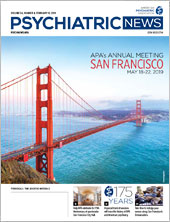APA is offering an opportunity to earn Maintenance of Certification (MOC) credit through an innovative and interactive course at this year’s Annual Meeting. Participants in the master course “Essential Psychopharmacology,” directed by Alan F. Schatzberg, M.D., will be eligible to earn both self-assessment credit (Part 2 of MOC) and Performance-in-Practice (PIP) chart review (Part 4 of MOC) credit.
The course will be held Tuesday, May 21, from 8 a.m. to 5 p.m. at the Moscone Center. It will cover the latest information on the pharmacologic treatment of major psychiatric disorders and include case discussions.
For the self-assessment activity, participants will take a pretest using audience feedback technology. A projector will display each multiple-choice question on a large screen. After participants have entered their answer, the course director will reveal the correct answer, as well as the distribution of audience responses.
Participants will be eligible to earn up to two hours of self-assessment credit (Part 2 of MOC) by participating in the live multiple-choice question review during the course and by completing a post-course follow-up in the APA Learning Center at education.psychiatry.org.
For the clinical PIP module activity (completion of three stages fulfills a Part 4 MOC requirement), participants will complete Stage A by reviewing five charts prior to the course using a tool available to course registrants in the APA Learning Center. (Course registrants will be provided with an access code.) They should choose one of the following medication classes for the chart review: SSRIs, benzodiazepines, atypical antipsychotics, or anticonvulsants/lithium and assess on five charts specific quality measures for one of the medication classes.
After the meeting, participants who wish to obtain MOC PIP credit must log in again to the APA Learning Center and complete Stage B of the PIP module (the improvement plan). To finish the clinical PIP module, participants must also complete Stage C by reviewing five more charts (of the same patient or different patients) after the initial completion of Stages A and B, note improvements, as well as complete an online evaluation. (All stages must be completed by December 31, 2019.) Course registrants will receive a Learning Center access code to claim credit for these special course elements. ■
To register for the course, see registration information
here.
